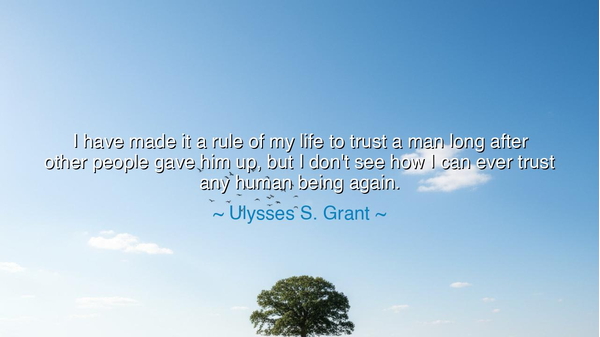
I have made it a rule of my life to trust a man long after other
I have made it a rule of my life to trust a man long after other people gave him up, but I don't see how I can ever trust any human being again.






The words of Ulysses S. Grant—“I have made it a rule of my life to trust a man long after other people gave him up, but I don’t see how I can ever trust any human being again”—fall with the heavy weight of sorrow and disillusionment. They are not the words of a weak man, but of a warrior and statesman, one who led armies through fire and blood, and who bore the burdens of a nation upon his shoulders. In these lines, Grant unveils the pain of betrayal, the shattering of confidence that comes when loyalty is answered not with faithfulness but with treachery. His voice is at once noble and broken: noble, because it reveals his habit of generosity in giving men the gift of trust; broken, because he speaks of the ruin left behind when that trust is finally destroyed.
The origin of this quote is found in the twilight of Grant’s life, when, after serving as victorious general of the Union and President of the United States, he fell prey to the schemes of men he had trusted. His financial ruin, brought about through the corruption of Ferdinand Ward in a banking partnership, left him devastated. Grant, who had weathered the storms of war and political intrigue, found himself undone not by cannon or ballot, but by misplaced trust in those who cloaked deceit in friendship. Thus, his words arise not from abstract thought, but from the searing fire of personal betrayal.
This truth has echoed across history. Consider Julius Caesar, who too was known for his willingness to pardon enemies and extend loyalty beyond reason. Yet it was this same openness that allowed Brutus, once trusted as a friend, to stand among the assassins who struck him down. The shock of Caesar’s cry—“Et tu, Brute?”—mirrors Grant’s lament: the deepest wound is not dealt by the hand of an enemy, but by the betrayal of one once held in trust. Both stories remind us that confidence in others is both the noblest strength and the most dangerous risk of leadership.
Yet Grant’s words also teach us something profound about the nature of the human spirit. To give trust is to choose hope over fear, generosity over suspicion. A man who trusts long after others have given up is one who believes in redemption, who sees the possibility of goodness even in flawed souls. This is not naiveté—it is a deliberate act of courage. But even the strongest heart, when wounded again and again, may reach the breaking point. Grant’s cry is that of one whose hope had been stretched to its limit, whose faith in mankind had been cracked under the weight of deceit.
The meaning here is twofold: first, that trust is essential to human relationships, to leadership, to progress itself; second, that betrayal of that trust has the power to break even the strongest. For every bond of loyalty is like glass: transparent, fragile, and beautiful when kept whole—but once shattered, it is nearly impossible to restore to its original form. Grant’s despair reflects this tragic reality: to lose trust is not merely to lose faith in one person, but to lose faith in humanity itself.
The lesson for us is one of balance. We must be willing to extend trust, for a world without it is a barren desert where no relationship can grow. Yet we must also be discerning, guarding our hearts and our futures against those who would abuse our confidence. Trust should be given generously, but not blindly; renewed when earned, but withdrawn when consistently betrayed. To give trust wisely is to walk the narrow road between the cynicism that isolates us and the gullibility that destroys us.
Practically, let each of us strive to be worthy of the trust placed in us. Guard it as one guards a sacred treasure, for when betrayed, it may never be regained. And when we give trust, let us give it with both courage and prudence, watching not only for words but for deeds. If betrayal comes, let it not turn us into bitter souls who trust no one, but into wiser souls who trust carefully. In this way, we honor the noble spirit of Grant, who trusted long even when others would not—and we avoid the despair that consumed him when that trust was broken.
Thus, the voice of Grant still speaks across the centuries: “I have made it a rule of my life to trust a man long after other people gave him up, but I don’t see how I can ever trust any human being again.” It is both a warning and a lament, urging us to recognize the power of trust to build or to destroy. May we heed this wisdom, giving trust where it is deserved, guarding it where it is at risk, and living in such a way that others may never regret having placed it in us.






AAdministratorAdministrator
Welcome, honored guests. Please leave a comment, we will respond soon